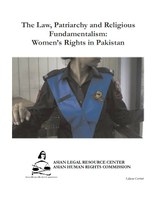 Foreword
Foreword
The women of Pakistan bear the brunt of poor governance, military strife, and the corruption of the social, political and economic systems which surround them. W omen make up 49% of the population of Pakistan, yet they are continuously marginalized and discriminated against by the middle class and feudal societies, and through political and social structures which are inherently misogynistic. Recently, eruptions of violence in cities across the region have prompted new concerns that militia are specifically targeting women in their terror campaigns.
As an explicitly Muslim state, the women of Pakistan are beholden to a number of Islamic principles. For one, the family is seen as the nucleus of society, the fundamental building block from which the rest of society emerges and evolves. Women are seen to be responsible for maintaining the sanctity of the family, and are thus those who are most likely to disrupt this sanctity. As such, the woman becomes the lynch pin of an ordered society; it is on her back that responsibility and power lies, both for her family and by extension, for all of society. While the violence against women enacted in this society occurs for manifold reasons, it seems that this understanding of women as both the lynch pin and the one with the power to unravel society, is a contributing factor to the continual mistreatment of women in Pakistan.
Violence against women is seen to be of no importance to the judiciary of Pakistan, particularly the lower judiciary. Women face numerous types of violence perpetuated by the state and its agents, including rape, gang rape, torture, registration of false cases of adultery, honour killing, Jirga (an illegal, parallel judicial system for the exchange of minor girls in land disputes,) burying alive or putting before dogs, acid throwing, no free choice of marriages, restriction of freedom of movement and expression, domestic violence, sexual harassment at the workplace, snatching of children, forcing conversion to Islam, blasphemy, deprivation of property rights, disappearance after arrest and being used as sex slaves in military torture cells.
The main causes of this violence stem from a lack of proper investigative mechanisms by the police, and the presence of a strong feudal system, which contribute to the ultimate failure of the judicial system. In the urban centers of the country, the judiciary is indirectly under pressure from the landed aristocracy, as in the case of rural areas where there is no question of women getting relief (not even bail after arrest) from the lower judiciary.
In the past years, the Pakistan Desk at the Asian Human Rights Commission (AHRC) has broadly worked on the problem of violence and other forms of violation of fundamental human rights suffered by women in the country.
Several cases of gender-based violence and discrimination have become urgent appeals and have been also brought to the attention of authorities in Pakistan and relevant United Nations’ Special Rapporteurs as well as the UN Human Rights Council.
The Pakistan desk of AHRC has come out with the book, The Law, Patriarchy and Religious Fundamentalism: Women’s Rights in Pakistan which was based on the research conducted by Liliana Corrieri and cases worked by the AHRC.
Due to her interest in gender issues, Liliana was asked if a piece of work on women’s rights in Pakistan could interest her. She was very happy to accept this assignment and throughout the process of researching and writing she proved solid dedication and firm commitment. It was a challenging task for her, considering the harshness of the cases under consideration and her Italian roots, which entail a profoundly different mindset in its understanding of human interactions and a diverse set of social norms and cultural practices.
Her unrelated background, though, could guarantee a very analytical approach and an objective analysis of those serious levels of inequality which affect women in Pakistan and translate into the disrespect they suffer from a legal, civil, social and economic perspective. In her work, Liliana explored the recent history of Pakistan, the several abuses beared by Pakistani women of all ages and the way such crimes continue to be perpetuated and condoned in the name of customs, tradition and religion. Her analysis also covered the prosecution and judicial systems operating in the country, as two fundamental state apparatuses whose inefficiency and gender-bias further bear upon any form of remedy women may hope for.
This book should not be seen as a throughout and comprehensive analysis of the status of women in Pakistan. It wants to offer an investigation based on the cases documented by the AHRC and a sincere interrogation of mindsets, attitudes and practices.
Baseer Naweed
Published in December 2013 by the Asian Legal Resource Centre (ALRC), Asian Human Rights Commission (AHRC), 256 pages, Language: English, ISBN: 978-962-8314-64-5 (Print Version) ISBN: 978-962-8314-65-2 (Online Version); PID: AHRC-PUB-005-2013
For orders and enquiries: Email books@ahrchk.net or call +(852) 2698 6339 +(852) 2698 6339.
Click here to download this publication in PDF format.